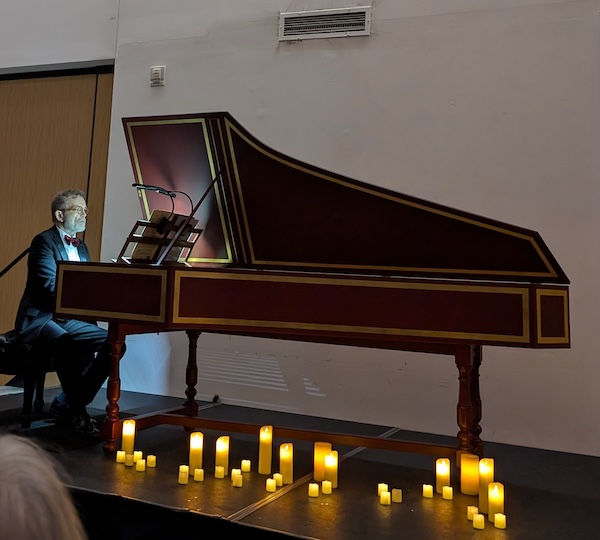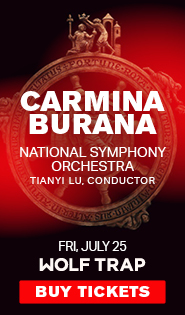Rousset caps Festival Capriccio with celebration of French music

Christophe Rousset performed for Festival Capriccio Tuesday night at La Maison Française. Photo: WCR
Festival Capriccio, the first harpsichord festival hosted by Capriccio Baroque, concluded Tuesday night. Christophe Rousset gave the last of the festival’s four performances in the ballroom of La Maison Française. Building on his colleagues’ concerts of Bach and Italian music, the preeminent French harpsichordist focused on three giants of French keyboard history: François Couperin, Antoine Forqueray, and Pancrace Royer.
Rousset has recorded all of the evening’s selections over the course of his distinguished career, in versions that remain references. The chance to hear him live, for his first solo recital in Washington since a double-concert in 2013, drew a capacity crowd for this normally more intimate series. It capped what has been a banner year for Rousset in Washington, after a couple guest appearances with Opera Lafayette last season.
The evening opened with Couperin Le Grand’s complete 17e Ordre, five dances with fanciful titles published in his Troisième Livre de pièces de clavecin in 1722. During his introductory remarks, Rousset joked about the harpsichord’s lack of expressivity, a stereotype that he managed to dispel once again. With a smooth connective touch, each note placed carefully, he stretched and shaped the rhythmic fabric of these pieces to a most expressive effect.
This approach brought out the contrapuntal interplay of the first dance, “La Forqueray,” an Allemande in all but name. The second movement, “Les Petits Moulins à Vent,” whirled excitedly in a faster tempo. A few minor infelicities in the Couperin pieces proved the exception in an evening of masterfully coordinated and accurate playing. Rousset brought out the rhythmic complexity of the delicate middle movement, “Les Timbres,” the ornate decoration of the Courante, and the turning motif of “Les Petites Crémières de Bagnolet.”
In the middle of the program, Rousset revisited his 2001 recording of suites of viol pieces by Antoine Forqueray, posthumously arranged for keyboard by the composer’s son, Jean-Baptiste Forqueray. Four pieces from the Quatrième Suite revealed Forqueray’s more daring harmonic style, in the opening dotted-note movement “La Marella,” a far cry from the more urbane Couperin. More virtuosic technical demands, like hand crossings in “La Clément,” presented little trouble for Rousset either.
This suite’s Sarabande (“La d’Aubonne”) proved the most enigmatic piece of the evening until the encore, its tangled questions carefully unwrapped by Rousset’s hands. After the gigue-like “La Bournonville,” complete with delightful hesitations and pauses, Rousset proceeded without applause to tack on the Chaconne (“La Buisson”) from the Deuxième Suite. Set in the major mode, this extended piece sounded radiant and uplifting, complete with a charming refrain that returned several times.
Rousset’s 2008 recording of the sole book of harpsichord pieces by Pancrace Royer significantly enhanced the composer’s status among musicians. Rousset extracted the fifth to eleventh movements from the collection for this recital, beginning with the stops and starts of “L’Incertaine” and the curling patterns of “L’Aimable.” In the latter movement, among others, Rousset used the upper manual of the 1991 Thomas and Barbara Wolf harpsichord, the same that he played a decade ago at the Library of Congress, to add a whimsical echo effect to the score.
The “Bagatelle” and its “Suite” appealed to Rousset’s rascally side, with musical jokes bouncing back and forth. Dancing rhythmic vitality enlivened the chatty “La Rémouleuse,” with its largely treble-focused texture. More delicately applied rubato gave a sweet variety to “Les Tendres Sentiments,” with “Le Vertigo” offering a chance for more virtuosic display, from rapid runs to frantically repeated chords.
For a first encore Rousset turned to the final movement of the same Royer suite, the warlike “Marche des Scythes,” taken at a deliberate tempo that heightened the sense of anger that impelled it forward. To cool the excited audience back down, Rousset offered a nightcap of Couperin, the mysterious “Ombres errantes,” played with an unnerving rhythmic freedom that depicted its subject quite convincingly.
Anna Kiskachi plays a selection of harpsichord music to be announced 8 p.m. May 10. capricciobaroque.org

